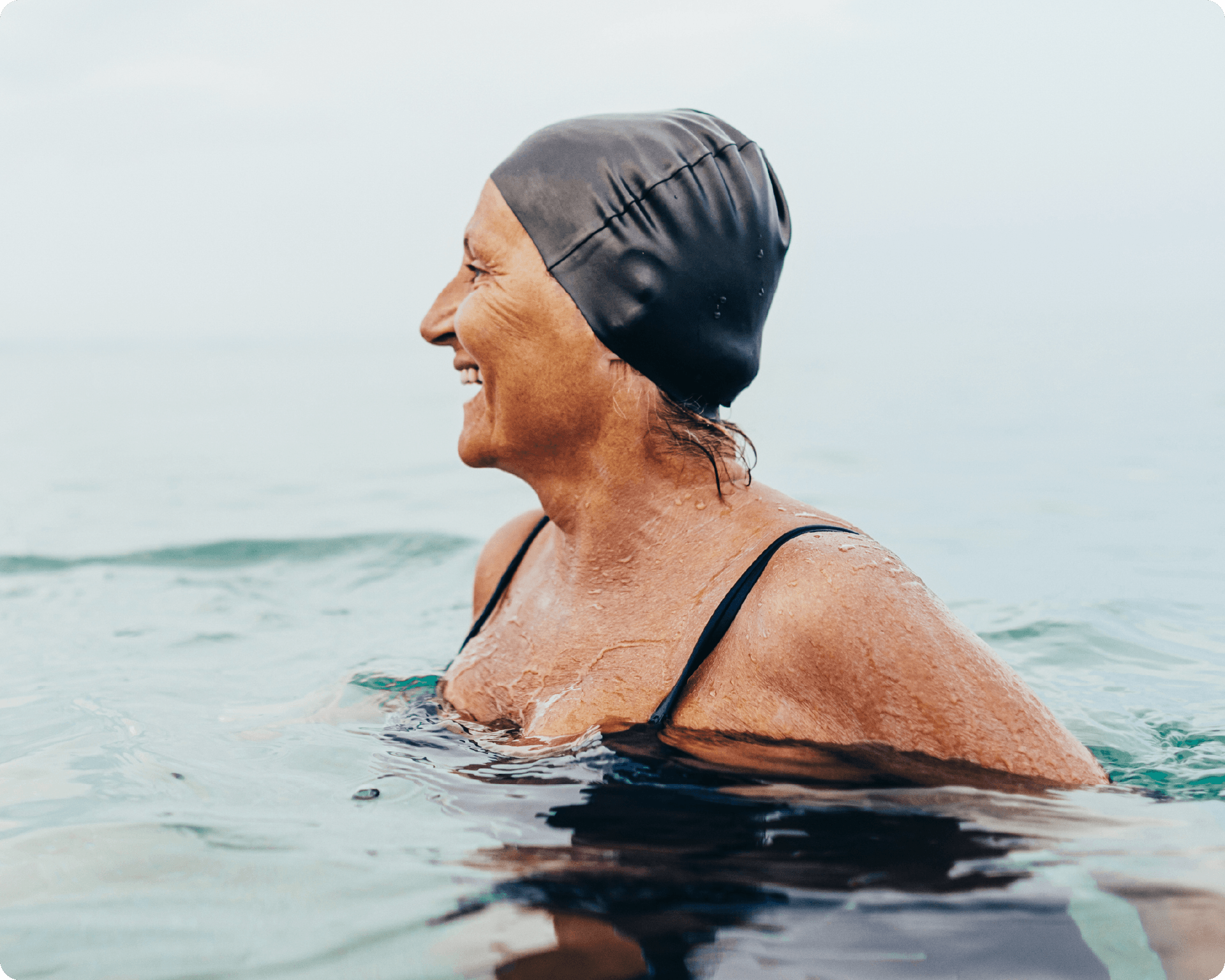“I enjoy the sense of peace that comes with swimming outdoors. I find that I have to really concentrate on my breathing, which in turn helps to slow down my thoughts.”- Dr Laura Cawley.
Being an experienced cold water swimmer as well as a menopause specialist, I was keen to explore this question. I have swum outdoors for nearly 15 years now. The number of people at the venues I train at has surged in recent years and the demographic is interesting. The majority of swimmers are female, many of whom are in their 40s and upwards. I decided to carry out a survey in 2021. I posted a link to my survey, which comprised of nine questions, on two Facebook groups. One was a local Sheffield open water swimming group, and the other was on the ‘Outdoor Swimming Society’ group, which currently has 110.2k members.
I received answers from 1124 ladies. I had to close the survey as the platform I was using started to charge me due to the high numbers. I am sure I would have received many more responses if it had remained open. The majority of respondents were between 46-55 years old, with ages ranging between 40-60 years old and 8% over 60.
Question seven asked: ‘How would you sum up, in a few words or a sentence, how swimming outdoors makes you feel’. Here is a word cloud formed by the answers:
Question three asked; ‘Why do you swim?’. The majority answered, ‘for my mental health’. Question six asked; ‘which menopausal symptoms are best relieved by you swimming in open water?’. I listed 23 possible menopausal symptoms, and the top three answers were: feeling tense or nervous, feeling tired or lacking in energy and feeling unhappy or depressed.
Many of my patients share my passion for swimming and find that it helps alleviate some, or all, of the menopause symptoms they experience. If this isn’t something you have tried, but have always wanted to, why not head to your nearest group and join them? In this article, we explore cold water swimming and its benefits during menopause, so that you can make an informed decision about trying this activity.
What is cold water swimming?
Cold water swimming, also referred to as open water swimming, is a recreational exercise. It is different to traditional swimming as rather than taking place in a heated manmade pool, you do it in an unheated lido or natural bodies of water such as:
- Rivers
- Large ponds
- Lakes
- Seas1.
While traditional pools are usually heated to 25-28ºC, the average temperature of outdoor water environments in the UK is 12 ºC, even in summer months (1).
The benefits of cold water swimming
Cold water swimming has numerous physical and mental health benefits, regardless of your stage of life. Even swimming for just 30 minutes a week can reduce the risk of heart disease, stroke and type 2 diabetes (2). It also improves circulation by redirecting blood flow to vital organs, which encourages your body to circulate blood more efficiently and effectively (2).
There is some evidence, albeit limited, that cold water swimming may boost the immune system. It’s thought that the short stress that the body experiences from cold water immersion primes the immune system to tackle threats, however, more research is needed to confirm this hypothesis (2).
Although a form of exercise in itself, cold water swimming can help with muscle stiffness and soreness and joint pain that arises from intense exercise as it reduces muscle inflammation and lowers the damage of affected tissue (3).
Cold water swimming can also be a great tool for weight management when done regularly. This is because, when the body is submerged in cold water, it must work harder to maintain its core body temperature. As a result, the body’s metabolic rate increases to produce heat. Research has found that cold water immersion can increase your metabolic rate by up to 16%3.
When it comes to mental health, cold water swimming helps boost dopamine levels and release endorphins, much like any other exercise. This can contribute to you feeling relaxed and content (2).
In addition, it’s thought that cold water swimming can reduce anxiety by reducing the stress hormone cortisol. When the body enters cold water, its flight or fight response is provoked, increasing blood pressure, heart rate and breathing pace, all of which cause cortisol to be released. However, the more you go cold water swimming, the more your body becomes accustomed to the temperature, and this reduces your body’s overall stress response mechanisms (2, 4).
Tips for cold water swimming
Cold water swimming is fun, exhilarating and beneficial to physical and mental health but like many activities, it isn't without risk. It's important to be aware of these and take the necessary precautions. You should always speak to your doctor beforehand to check it’s safe for you and abide by the following:
- Never swim alone – find a friend to go with or join a group.
- Never jump into cold water – enter slowly to allow your body to get used to the cold.
- The best way to try it is to start swimming in the summer when the temperatures are warmer and gradually acclimatise throughout the colder months.
- Choose your swimming spot carefully and opt for a lifeguarded beach if possible.
- Assess hazards before you enter the water.
- Wear a wetsuit and a brightly coloured swim hat and always take a tow float with you.
- Always take a means of calling for help with you.
- Ensure you have warm clothes to change into after your swim.
How can cold water swimming help during menopause?
Aside from its overall positive impact, cold water swimming can help with specific aspects of health, with menopause being one.
All women who have periods go through menopause, with it typically occurring between the ages of 45-55 (6). Up to 90% of women will experience menopause symptoms, with a quarter describing them as severe and debillitating (6). Symptoms may vary but can last for years.
Hormone replacement therapy (HRT) is often the recommended treatment for menopause symptoms but other management tools, such as cold water swimming, can be beneficial in addition to, or instead of HRT. In research published in Post Reproductive Health, 63.3% of women surveyed said they specifically swam to relieve their menopause symptoms (7(.
Let’s look at how cold water swimming during menopause can help with specific symptoms.
Hot flushes and night sweats
Vasomotor symptoms (VMS) including night sweats are some of the most common symptoms of menopause, affecting 70-80% of women (6). They are characterised by a sudden feeling of heat that usually starts in the chest and can be accompanied by redness and a racing heartbeat (8).
Many women find them uncomfortable and embarrassing but, in some cases, they can be incredibly disruptive to daily life.
Research indicates that menopausal women who cold water swim see significant improvements in VMS, with 30% of women reporting this benefit (7).
Anxiety and depression
Many women experience a decline in mental health during menopause, with more than half experiencing neuropsychiatric conditions (9).
However, in one study, women reported that cold water swimming notably reduced psychological symptoms. Anxiety improved in 47% of women and depression was positively impacted in 28% of cases (10).
Mood changes
Fluctuating levels of the hormones oestrogen and progesterone during menopause can affect your mood. In addition, challenging menopause symptoms can leave you not feeling like yourself which is why it’s not uncommon to feel irritable or experience mood swings.
However, cold water swimming has been shown to drastically improve the mood changes that occur in menopause.
- 35% of women report reduced mood swings.
- 31% have fewer instances of low mood.
- 38% say they are less irritable (10).
Sleep disturbances
Fatigue during menopause is a common complaint driven by hormone changes. Menopause and sleep quality are linked, with women often finding they have difficulty falling asleep and trouble staying asleep due to VMS, the need to urinate or other symptoms.
21% of women report that cold water swimming improves sleeping troubles. Interestingly, women who wore a wetsuit were more likely to report a reduction in symptoms compared to those who wore swimming costumes (10).
Other symptoms
In a study that looked at how cold water swimming affects menstrual and perimenopausal symptoms, women self-reported perceived improvements. Aside from the above, women reported improvements in the following menopause symptoms:
- Brain fog
- Concentration
- Memory
- Confidence
- Tearfulness
- Aching joints and muscles
- Muscle tension
- Headaches/migraines
- Breast soreness
- Bloating
- Itching
- Paranoia
- Restless leg syndrome
- Sex drive
- Heart palpitations
- Incontinence (10)
With cold water swimming being described as ‘healing’ and ‘energising and calming at the same time’ (10), it’s no wonder that many women find it a beneficial tool in managing menopause symptoms. If you are interested in finding out about other strategies, Menopause Care can help.
Our clinicians are here to discuss your personal experience of menopause and provide tailored advice and treatment recommendations. For a holistic approach to navigating menopause, book a consultation with a menopause doctor.
Can cold water swimming treat depression? - BBC News (September 2018)
What is the menopause? (October 2021)





